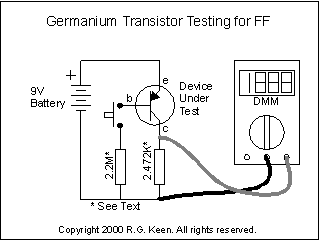BuddytheReow
Moderator
Finally got my small bear order in and need to measure pinout, hre , and leakage. I've got npn and pnp for both silicon and geraniums. Is there a cheapo one from Amazon you guys can recommend? Thanks
Will that measure germanium leakage?I just ordered this one. Won’t be here till Monday, but someone else around here has one…
https://www.amazon.com/gp/aw/d/B091281YKX?ref=ppx_pt2_mob_b_prod_image

I use the same one. Decent enough for Ge transistors, here is how I interpret the measurements:
I’ll let you know on Monday.Will that measure germanium leakage?




Does it measure leakage?I honestly have the worst luck with these. I've had two of the model above and neither of them lasted more than four weeks. Both of them turned off during a test and just didn't turn on again.
I also had a TC7? I think that was the model number and the screen died on it. You could still just about see the text so it must have been the backlight.
I was going to buy a Peak Atlas but don't really have the cash at the minute and I need to test some transistors for a build this weekend. I thought I'd try one more and this guy turned up about 20 mins ago
View attachment 16844
I have a few issues so it's going back to Amazon tomorrow. Problem A - the battery cover won't fit over a 9v battery. As you can see below the battery sits higher than the shelf the flat cover slides over.
View attachment 16845
Problem B - The blue adaptor to connect the components was in the battery cover when it arrived. It just slides into some holes below it. Whenever you put a part in to test you have to hold the other side or it just lifts up when you lock a part in place
View attachment 16846
I know these are cheap but this one feels especialls pants
On the plus side it does seem to be pretty accurate.
View attachment 16847
Does it measure leakage?

As someone who has killed many a cheapo tester, the sturdier & more accurate DCA55 is worth the money if you're looking for a long-term solution. I only wish it could also measure JFET Vp & Idss, as that would make it the standout option over cheaper testers. Unfortunately, only the DCA75 does that, and it's $130 vs. $60 for the DCA55I have the DCA55 and I’d say it was worth the splurge.
I do the same with a veroboard matcher and it works great! To more easily compare JFETs for matching, you can also calculate Rds(on) from:I contemplated getting a DCA75 when I was making my Aion Ares, but since I only use JFETs sparingly, it's more economical to just whip up a JFET tester on the breadboard when I need it.

